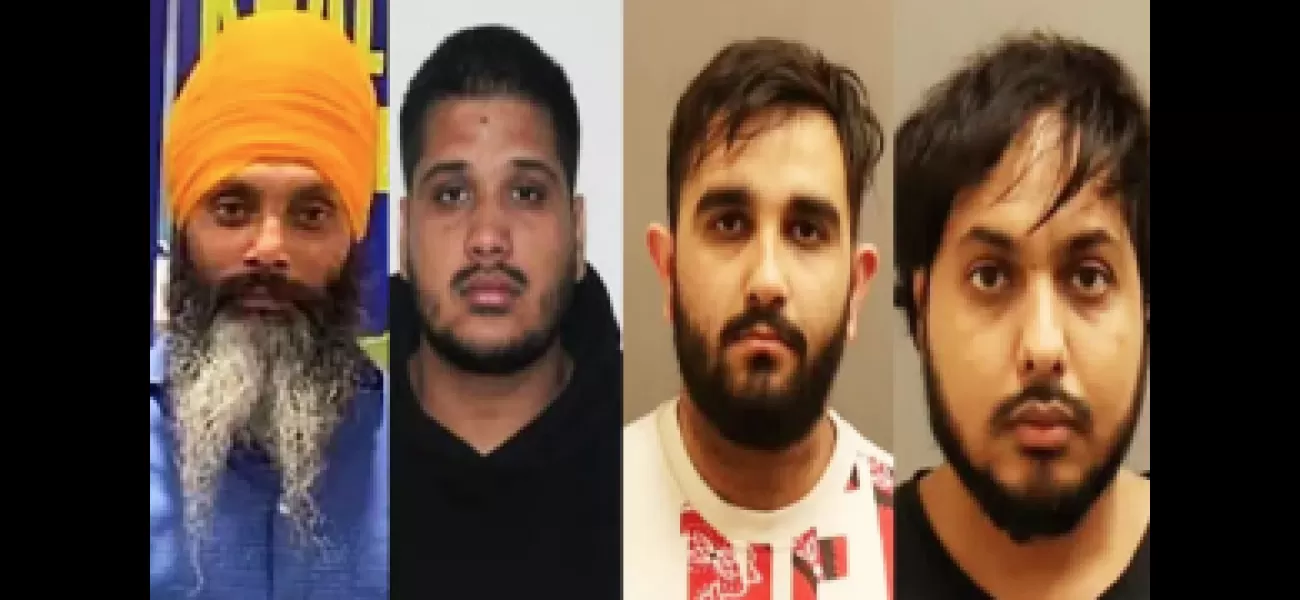Three Indians facing charges for murder of Nijjar, a Khalistan separatist, appear in Canadian court.
Three Indians accused of killing Hardeep Singh Nijjar appeared in a Canadian court via video for the first time, causing tension between Canada and India.
May 8th 2024.

In a recent court appearance, three Indian nationals were accused of the murder of Khalistan separatist Hardeep Singh Nijjar, which took place last year. This case has caused tension between Canada and India. The accused, Karan Brar, 22, Kamalpreet Singh, 22, and Karanpreet Singh, 28, who are currently living in Edmonton, were arrested and charged with first-degree murder and conspiracy to commit murder on Friday.
According to the Vancouver Sun newspaper, the three were brought before the Surrey Provincial Court in British Columbia, appearing separately through video from the North Fraser Pretrial Centre. They were all wearing red jail-issued shirts and sweatpants. Two of the accused appeared in the morning, while Kamalpreet Singh's appearance was delayed until after lunch to give him time to consult with a lawyer. All three agreed to have the proceedings in English and nodded that they understood the charges against them.
The Crown prosecutor requested a no-contact order be placed on the accused, naming seven people who they are prohibited from communicating with. These individuals include Nijjar's son Balraj Nijjar, 21, and Harjinder Nijjar, Mehtab Nijjar, Sarandeep Sehaj, Harsimranjeet Singh, Arshdeep Kapoor, and Malkit Singh.
On Saturday, the three accused had a brief appearance before an adjudicator for an interim judicial release hearing, after which they were held in custody. Their next step is to apply for bail through their lawyers, but according to Surrey criminal and immigration lawyer Affan Bajwa, their chances of being released on bail may be slim due to the potential risk of flight and public safety.
If the case proceeds, the men will be tried in Canada and could face a sentence of at least 25 years without parole if found guilty of first-degree murder. If they are foreign nationals or permanent residents, they will also face a deportation hearing by the Canada Border Services Agency once released.
However, even if they are found not guilty, they could still face deportation under the Immigration and Refugee Protection Act. This was highlighted in a Supreme Court of Canada ruling in September, in which a foreign national could be deemed inadmissible to Canada on security grounds.
The court was packed with hundreds of local Khalistan supporters, and an overflow room was opened to accommodate more people who wanted to witness the hearing. Outside the courthouse, about 100 people waved Khalistan flags and held posters in support of Sikh separatism.
Nijjar, a Canadian citizen, was shot and killed outside a gurdwara in Surrey on June 18, 2023. The indictments allege that the conspiracy took place in both Surrey and Edmonton between May 1, 2023, and the date of Nijjar's murder. The accused were suspected of being involved in drug trafficking and violence.
India has rejected comments made by Canadian Prime Minister Justin Trudeau regarding the killing of Nijjar, stating that they once again highlight Canada's political allowance of separatism, extremism, and violence. Trudeau spoke at a Khalsa Day event in Toronto, which was attended by some pro-Khalistan supporters.
The relationship between India and Canada has been strained since Trudeau's allegations in September last year, where he suggested the possible involvement of Indian agents in Nijjar's murder. India has dismissed these charges as "absurd" and "motivated."
The presence of Sikh separatist groups in Canada has long been a concern for India, as Nijjar was designated as a "terrorist." The police have hinted that more arrests may be made, with Royal Canadian Mounted Police Assistant Commissioner David Teboul stating that they are investigating connections to the government of India.
External Affairs Minister S Jaishankar stated that the recent events surrounding Nijjar's murder in Canada are mostly due to internal politics and have nothing to do with India. He explained that a section of pro-Khalistan individuals are using Canada's democracy to create a lobby and have become a vote bank. He also mentioned that India has repeatedly asked Canada not to give visas or political space to such individuals, as it causes problems for both countries. Despite India's extradition requests for 25 individuals, most of whom are pro-Khalistan, Canada has not provided any proof or evidence. Jaishankar believes that this is due to Canada's political motives and their upcoming elections.
According to the Vancouver Sun newspaper, the three were brought before the Surrey Provincial Court in British Columbia, appearing separately through video from the North Fraser Pretrial Centre. They were all wearing red jail-issued shirts and sweatpants. Two of the accused appeared in the morning, while Kamalpreet Singh's appearance was delayed until after lunch to give him time to consult with a lawyer. All three agreed to have the proceedings in English and nodded that they understood the charges against them.
The Crown prosecutor requested a no-contact order be placed on the accused, naming seven people who they are prohibited from communicating with. These individuals include Nijjar's son Balraj Nijjar, 21, and Harjinder Nijjar, Mehtab Nijjar, Sarandeep Sehaj, Harsimranjeet Singh, Arshdeep Kapoor, and Malkit Singh.
On Saturday, the three accused had a brief appearance before an adjudicator for an interim judicial release hearing, after which they were held in custody. Their next step is to apply for bail through their lawyers, but according to Surrey criminal and immigration lawyer Affan Bajwa, their chances of being released on bail may be slim due to the potential risk of flight and public safety.
If the case proceeds, the men will be tried in Canada and could face a sentence of at least 25 years without parole if found guilty of first-degree murder. If they are foreign nationals or permanent residents, they will also face a deportation hearing by the Canada Border Services Agency once released.
However, even if they are found not guilty, they could still face deportation under the Immigration and Refugee Protection Act. This was highlighted in a Supreme Court of Canada ruling in September, in which a foreign national could be deemed inadmissible to Canada on security grounds.
The court was packed with hundreds of local Khalistan supporters, and an overflow room was opened to accommodate more people who wanted to witness the hearing. Outside the courthouse, about 100 people waved Khalistan flags and held posters in support of Sikh separatism.
Nijjar, a Canadian citizen, was shot and killed outside a gurdwara in Surrey on June 18, 2023. The indictments allege that the conspiracy took place in both Surrey and Edmonton between May 1, 2023, and the date of Nijjar's murder. The accused were suspected of being involved in drug trafficking and violence.
India has rejected comments made by Canadian Prime Minister Justin Trudeau regarding the killing of Nijjar, stating that they once again highlight Canada's political allowance of separatism, extremism, and violence. Trudeau spoke at a Khalsa Day event in Toronto, which was attended by some pro-Khalistan supporters.
The relationship between India and Canada has been strained since Trudeau's allegations in September last year, where he suggested the possible involvement of Indian agents in Nijjar's murder. India has dismissed these charges as "absurd" and "motivated."
The presence of Sikh separatist groups in Canada has long been a concern for India, as Nijjar was designated as a "terrorist." The police have hinted that more arrests may be made, with Royal Canadian Mounted Police Assistant Commissioner David Teboul stating that they are investigating connections to the government of India.
External Affairs Minister S Jaishankar stated that the recent events surrounding Nijjar's murder in Canada are mostly due to internal politics and have nothing to do with India. He explained that a section of pro-Khalistan individuals are using Canada's democracy to create a lobby and have become a vote bank. He also mentioned that India has repeatedly asked Canada not to give visas or political space to such individuals, as it causes problems for both countries. Despite India's extradition requests for 25 individuals, most of whom are pro-Khalistan, Canada has not provided any proof or evidence. Jaishankar believes that this is due to Canada's political motives and their upcoming elections.
[This article has been trending online recently and has been generated with AI. Your feed is customized.]
[Generative AI is experimental.]
0
0
Submit Comment





